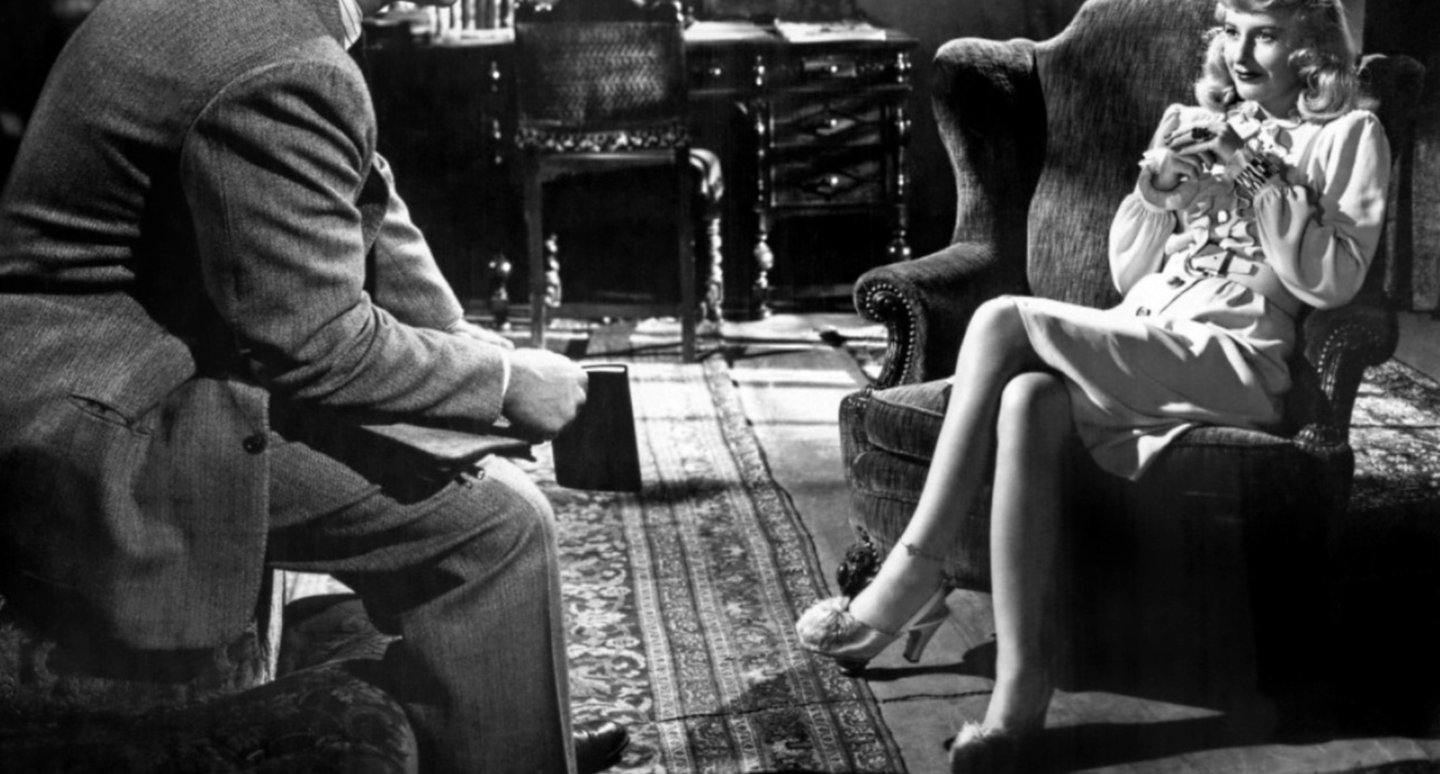Billy Wilder wasn’t exactly known for creating complex female characters, more predisposed instead to focusing on his male heroes and/or their buddy dynamic (which was often present in his own screenwriting partnerships with Charles Brackett and I.A.L. Diamond). Yet Double Indemnity‘s driving force, Phyllis Dietrichson (Barbara Stanwyck), was one of his more marked examples of a two-dimensional female lead–more specifically a femme fatale, that necessary trope of all film noirs.
From the moment she appears onscreen in (then scandalously) nothing more than a towel, she is established as a venomous Calypso type sure to damn insurance salesman Walter Neff (Fred MacMurray) to committing an irrevocable act (something that, unlike Odysseus, he can never escape). For she certainly doesn’t waste time in making a very glaring allusion to wanting to off her husband and claim the insurance money that would result–if only Walter would agree to making out the policy without his knowledge. No simp, Walter retorts, “Look, baby, you can’t get away with it. You want to knock him off, don’t you? What’d you think I was, anyway? A guy that walks into a good looking dame’s front parlor and says, ‘Good afternoon, I sell accident insurance on husbands. You got one that’s been around too long? One you’d like to turn into a little hard cash? Just give me a smile and I’ll help you collect.’”
Of course, being the ruthlessly calculating bitch she is, Phyllis pretends she wants no such thing–at first. Not until she can get Walter further on the hook with that Ensenada-bought perfume of hers. The one that Walter drinks in with more voraciousness than the scent of the honeysuckle that lines the street leading to her house. Yet it’s at his apartment that he surrenders to hatching a plan. One that stems from the belief, “In this business you can’t sleep… for trying to figure out all the tricks they could pull on you. You’re like the guy behind the roulette wheel, watching the customers to make sure they don’t crook the house. And then one night, you get to thinking how you could crook the house yourself. And do it smart. Because you’ve got that wheel right under your hands. You know every notch in it by heart. And you figure all you need is a plant out front. A shill to put down the bet.” But thanks to Phyllis’ machinations, Walter is the only shill in the equation. For Phyllis has no noble motivations for doing what she’s doing, while Walter, at least, agrees to execute the plan entirely based on his intense “love at first sight” sentiment for Phyllis (and her salaciously shown anklet). So blinded by his sexual infatuation that he ignores all the signs of her callousness. Of a variety that stems from a very boilerplate template. Case in point, she doesn’t get along with Mr. Dietrichson’s (Tom Powers) daughter, Lola (Jean Heather). And any stepmother who doesn’t get along with Daddy’s precious girl is automatically associated with evil in the annals of pretty much every fairy tale ever. Of course, Double Indemnity is no fairy tale, macabre to its core as Walter starts getting a little too close to Lola, who prefers to seek out the ruffian company of Nino Zachetti (Byron Barr)–until he, in turn, starts hanging out with her manipulative stepmom.
Behind the quagmire of all of these intertwined relationships, Phyllis is the puppetmaster, doing what she must to collect the check and oust anyone who stands in her way–but the only person she can’t fool about her husband’s “accidental” death is Walter’s longtime superior and comrade, Barton Keyes (Edward G. Robinson), claims adjuster extraordinaire. A man who would never be taken in by, to use a more modern turn of phrase than that which existed when this film came out, “a big butt and a smile.” Someone as unapologetically cutthroat as Phyllis, whose suspicious marriage to Dietrichson was very likely due to some of her own maneuverings to oust the original Mrs. Dietrichson. Because, goddammit, she needed to afford her hat addiction (hats and women being the ultimate frivolous cliche during this epoch, and up to the 1950s). One way or the other. She’s just that vacuous, as far as writer-directors of the genre (like Wilder) were concerned.
In aloof explanation for all of her cold-hearted wrongdoings, she confesses, “No, I never loved you, Walter, not you or anybody else. I’m rotten to the heart. I used you, just as you said. That’s all you ever meant to me.” And all the femme fatale ever meant to the men writing her was to hold her up as a cautionary tale of why “if you wanna be happy for the rest of your life, never make a pretty woman your wife.” So why bother imbuing a femme fatale with anything–least of all emotional complexity–other than an alluring physique topped by a stoic mug? She’s just a device, after all, not a person.




















